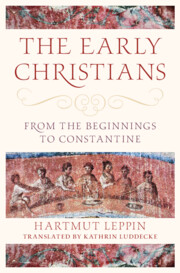Refine search
Actions for selected content:
3 results
26 - Constitutions as Vehicles for Legitimacy
- from Part V - The Imagined Order of the Constitution
-
- Book:
- The Story of Constitutions
- Published online:
- 19 October 2023
- Print publication:
- 02 November 2023, pp 311-313
-
- Chapter
- Export citation
Looking Back and Ahead
-
- Book:
- The Early Christians
- Published online:
- 05 October 2023
- Print publication:
- 26 October 2023, pp 368-393
-
- Chapter
- Export citation

The Early Christians
- From the Beginnings to Constantine
-
- Published online:
- 05 October 2023
- Print publication:
- 26 October 2023
